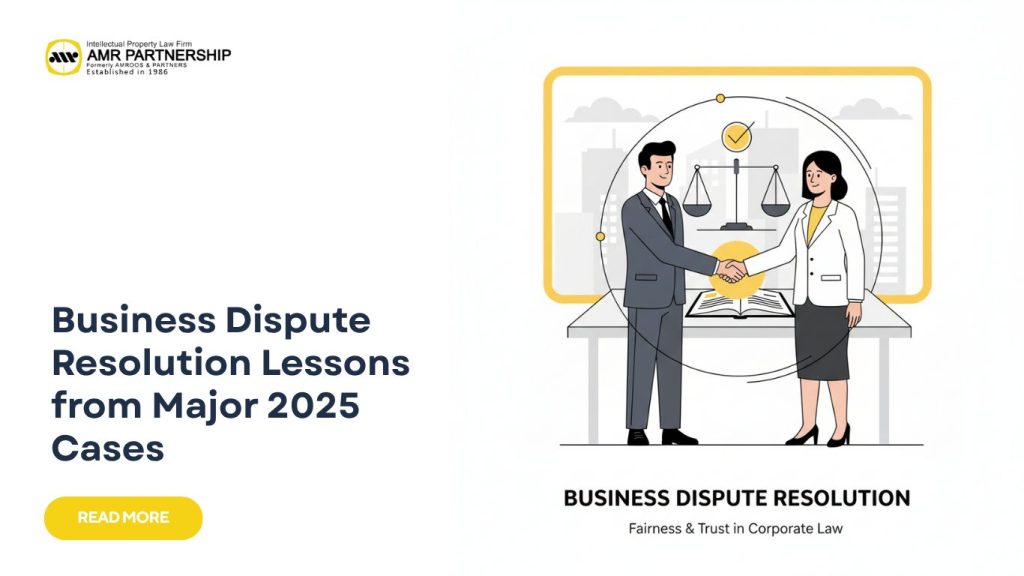
In the world of business, even the most established corporations can face turbulence. The year 2025 has already brought a series of high-profile disputes that underscore one critical truth, when money, contracts, and trust collide, Business Dispute Resolution becomes essential. For companies navigating complex relationships and global operations, understanding how to manage disputes effectively isn’t just a legal concern—it’s a strategic necessity. Through insights from recent cases, this article explores how proper dispute resolution, including litigation, arbitration, and mediation, protects both reputation and business continuity. For organizations seeking guidance, professional assistance from amr.co.id can provide structured legal strategies for resolving conflicts with precision and integrity.
READ MORE: How to Find the Right Contract Dispute Lawyer Near Me
Why Business Dispute Resolution Matters More Than Ever
In today’s interconnected economy, Business Dispute Resolution has evolved from being a reactive measure to a proactive business tool. The global marketplace has blurred boundaries between jurisdictions, contracts have grown increasingly complex, and public scrutiny has intensified—especially with the rise of transparency and corporate governance standards.
When a conflict escalates without proper management, it can erode investor confidence, disrupt operations, and even attract unwanted media attention. Early dispute management, through mediation or structured communication, often prevents costly litigation and protects relationships. According to a 2024 report from the International Chamber of Commerce (iccwbo.org), over 70% of international business disputes arise from unclear contractual terms and poor governance structures. This statistic reinforces why businesses must prioritize clarity and compliance in every partnership.
In 2025, several large-scale corporate cases in Indonesia and abroad have shown how governance failures can trigger chain reactions. Even state-owned companies have faced challenges related to procurement, partnership disagreements, and misaligned business goals. When these issues escalate, litigation becomes a last resort—but one that must be handled strategically.
Corporate governance and compliance are no longer optional. They are the backbone of any company’s legal resilience. A well-designed dispute resolution strategy not only resolves conflicts but also prevents them through early detection and structured decision-making.
READ MORE: How to Handle International Trademark Conflict Resolution Smartly?
What We Can Learn from 2025’s Big Cases
This year’s major disputes have highlighted important lessons about internal systems, transparency, and the need for strategic legal intervention. A recent high-profile case involving a state-owned enterprise demonstrated how internal audits and transparent investigations can de-escalate conflicts before they turn into full-scale litigation. These cases reveal that Business Dispute Resolution is not just about managing external claims—it also involves fostering accountability and ethical leadership within the company.
Here are a few key insights from recent corporate disputes:
- The role of internal investigation, companies with robust internal audit mechanisms are more likely to identify irregularities early, reducing exposure to public litigation.
- Transparency reduces risk, open communication and timely disclosure can prevent speculation and protect brand reputation.
- Choosing the right dispute mechanism, businesses that understand the strengths of arbitration, mediation, and litigation can minimize damage and achieve faster resolutions.
An analysis by the OECD (oecd.org) found that companies integrating compliance review with dispute management reduce litigation risks by up to 40%. This shows that an effective dispute resolution framework is not just about reacting to conflict—it’s about embedding preventive legal strategy into corporate governance.
READ MORE: Lawyer Indonesia: Key Role in Administrative Law Disputes
Common Triggers Behind Business Disputes
Most business disputes don’t start in the courtroom—they begin in meeting rooms, negotiation tables, or internal emails where trust begins to fade. Understanding common triggers can help businesses detect red flags early and address them before they escalate.
Common causes include:
- Unclear or rushed contracts that fail to define responsibilities or risk allocation.
- Miscommunication between business partners leading to unmet expectations or perceived breaches.
- Violation of confidentiality or non-compete clauses that damage partnerships.
- Weak governance and compliance failures allowing irregularities to go unchecked.
These issues often snowball into larger disputes when companies lack internal dispute management systems. For example, poor documentation during a partnership can make arbitration or litigation more complicated, as evidence becomes harder to substantiate.
To minimize these risks, companies should:
- Conduct periodic contract reviews.
- Implement whistleblowing mechanisms for early detection.
- Ensure every agreement includes a clear dispute resolution clause.
- Provide regular training for managers on compliance and negotiation.
Preventing disputes requires foresight, structure, and consistency—all of which can be supported by experienced legal partners like amr.co.id.
READ MORE: Understanding Trademark License Agreement Template: A Simple Guide for Business Owners
Choosing the Right Path to Resolution
Every business conflict has its own character. The ideal resolution method depends on the nature of the dispute, the parties involved, and the desired outcome. Generally, three main approaches are used:
Litigation
Litigation is the traditional path—formal, public, and often lengthy. However, it provides a binding judgment that can set a legal precedent. Companies usually choose litigation when negotiation fails or when they need a definitive, enforceable ruling. While it may appear time-consuming, litigation ensures accountability and transparency in complex disputes.
Arbitration
Arbitration offers a more confidential, expert-driven alternative. It’s particularly favored for international business disputes involving multiple jurisdictions. Proceedings are faster, and the outcomes are legally binding. Many businesses prefer arbitration because it allows for more flexibility and neutrality in selecting arbitrators who understand the industry context.
Mediation
Mediation focuses on dialogue and compromise. It is the most time-efficient and relationship-preserving approach. A neutral third party facilitates discussions to help both sides reach an agreement. This approach is often used when both parties intend to continue their partnership post-resolution.
Choosing the right approach depends on your organization’s goals. Do you want to win, or do you want to move forward? For many companies, a balanced strategy—starting with mediation and escalating to arbitration or litigation when necessary—offers the best of both worlds.
At this point, professional legal advisors become essential. Firms like amr.co.id provide structured assessments to determine the most effective resolution path, helping your business avoid unnecessary costs and reputational harm.
READ MORE: What Are Included in Intellectual Property? A Comprehensive List for Businesses and Creators
The Future of Business Dispute Resolution in Indonesia
Indonesia’s legal landscape is evolving rapidly. With stronger regulations and increased adoption of arbitration, companies are rethinking their dispute management frameworks. Government initiatives promoting transparency and accountability are pushing both private and state-owned enterprises to improve governance standards.
Digital transformation has also reshaped how disputes are handled. Electronic evidence, virtual hearings, and AI-based case analysis are streamlining litigation and arbitration processes. This transformation allows legal teams to operate more efficiently while maintaining procedural integrity.
As the business environment becomes more dynamic, law firms specializing in Business Dispute Resolution are playing a critical role—not just as litigators but as strategic partners. They help businesses develop preventive strategies, design clear contracts, and build internal policies that reduce exposure to legal risks.
Whether it’s through pre-litigation advisory or full dispute representation, amr.co.id provides scalable solutions tailored to each client’s structure and industry. The firm’s approach combines local legal expertise with international standards, ensuring that businesses are prepared for disputes before they happen.
READ MORE: Navigating IPR for E-Commerce and Online Businesses in Indonesia
Resolve Smart, Not Hard
Every dispute tells a story of trust, contracts, and choices. The smartest companies don’t just react to conflict—they prevent it with clarity, strategy, and strong legal partnerships. Business Dispute Resolution isn’t only about winning in court; it’s about safeguarding your company’s credibility and long-term stability.
For organizations seeking practical, legally sound, and cost-effective dispute strategies, amr.co.id offers professional assistance across litigation, arbitration, and mediation. Pricing depends on the complexity and scope of each case, but initial consultations are designed to help assess your company’s position and possible next steps. To discuss your specific situation, connect directly with our legal team via WhatsApp or Instagram. Resolve your disputes with confidence—because the right strategy today prevents costly battles tomorrow.
- Phone (Hunting): +62-21-29036668
- Fax: +62-21-29036672 to 75
- WhatsApp Customer Service: Click here to chat
- Instagram: @amrpartnership
- TikTok: @amr.partnership
- Facebook: Law Firm AMR Partnership
- Official Website: www.amr.co.id






